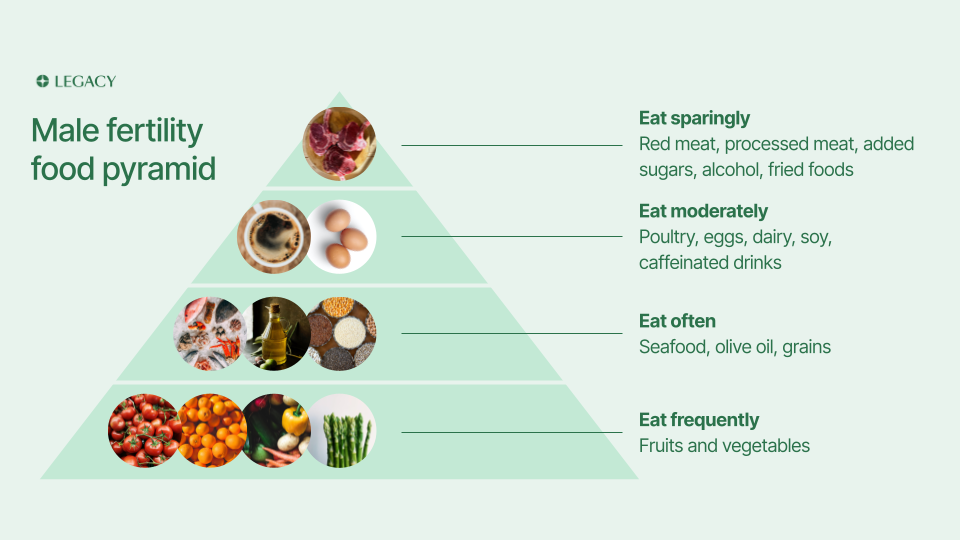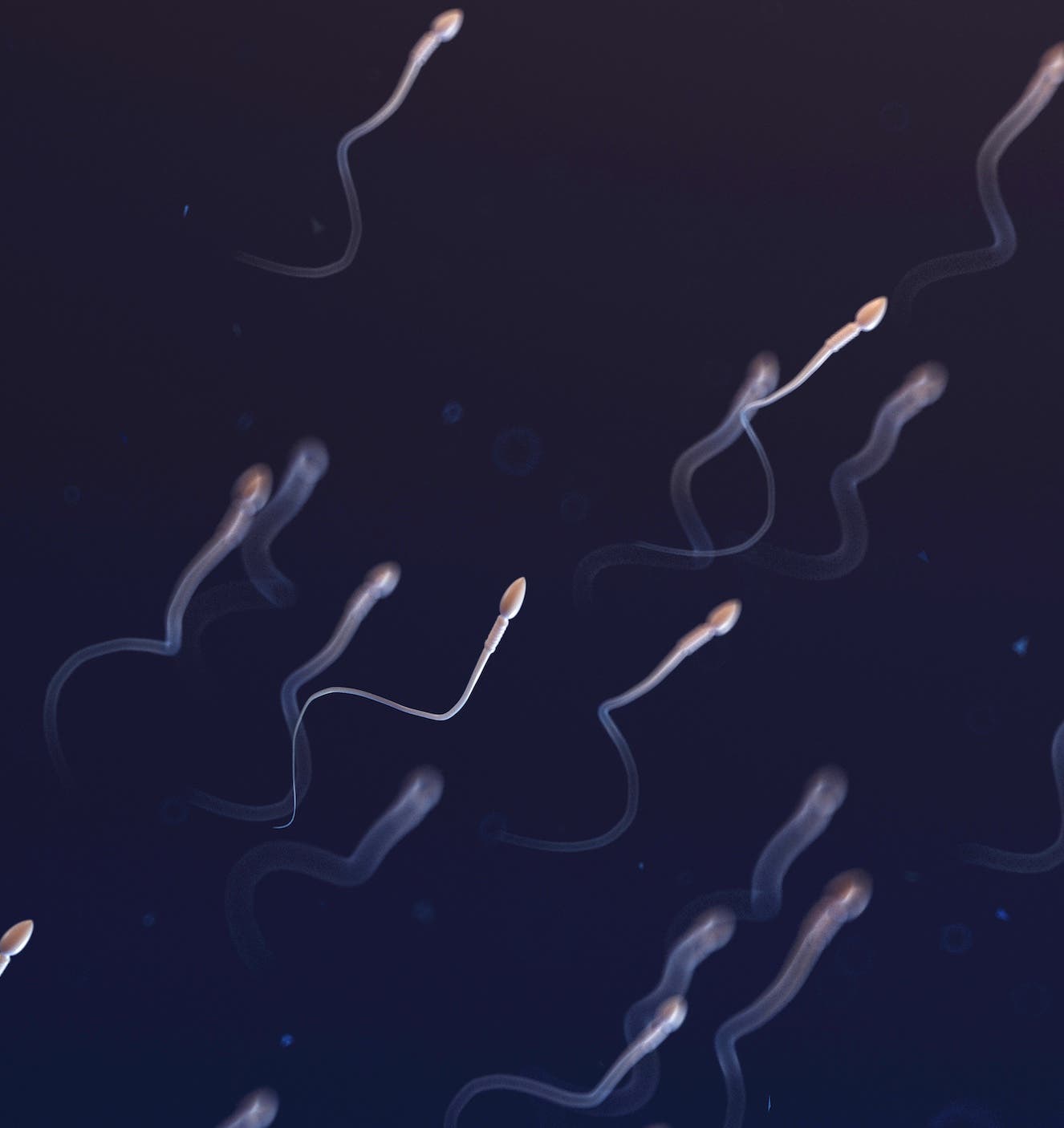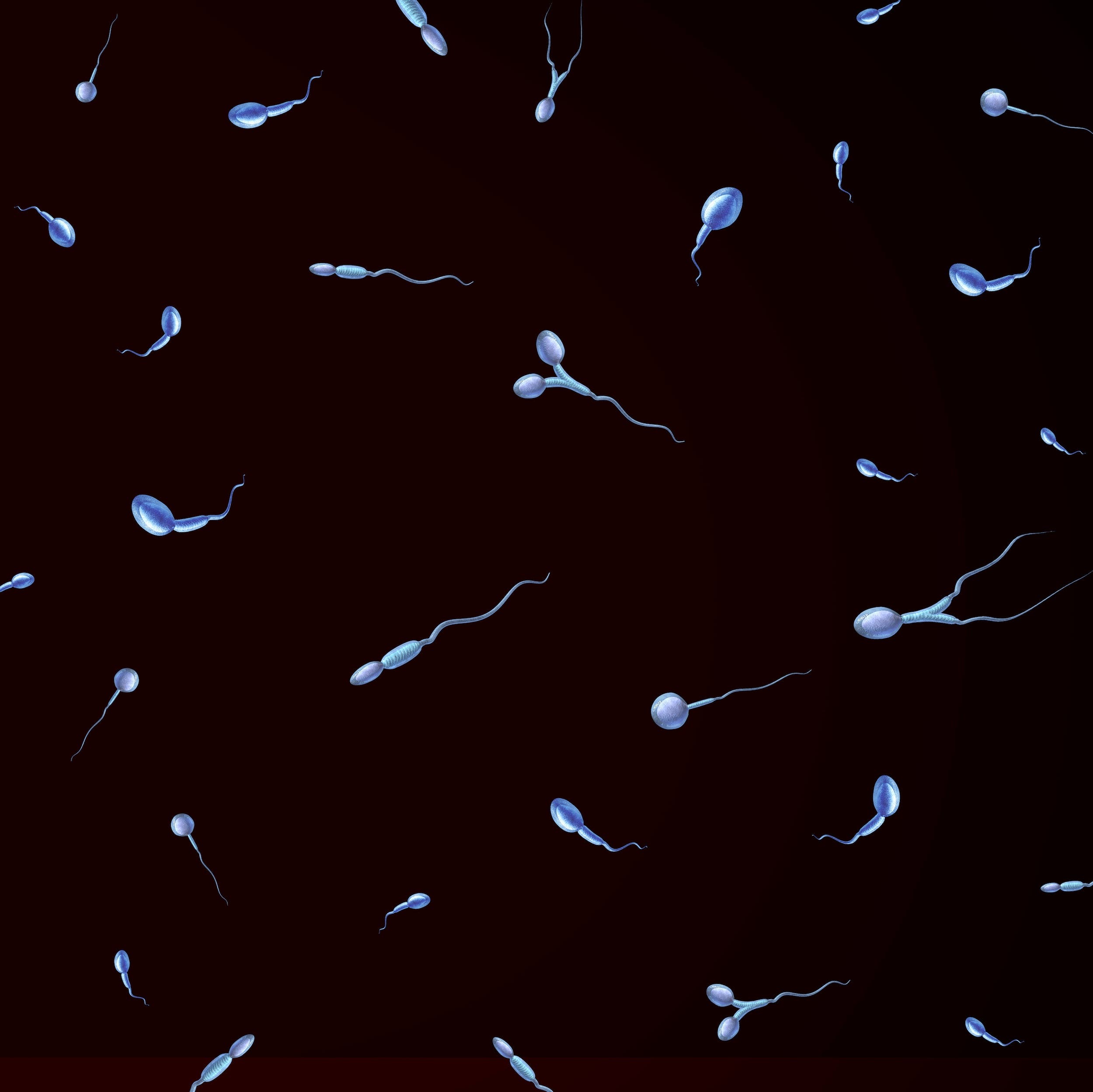If you are what you eat, your future children may be too. That’s the upshot of an animal study conducted by German researchers, who found that a father’s diet may affect his sperm and the metabolism of his sons. The research also suggested that high-fat diets were associated with lower sperm health.
How is that possible? And what nutritional best practices for fertility can help ensure the health of your sperm, not to mention a healthy legacy? Let’s take a closer look at the science.
Key takeaways
- New research in mice found that males who were fed a high-fat diet had different sperm development. Subsequently, the male children of those mice were more likely to have metabolic issues.
- This provides a potential explanation for a previous analysis in humans, which found that children whose fathers had a higher BMI (body mass index) were more likely to have metabolic problems.
- The takeaway is this: what you eat is likely to affect your sperm health, and maybe even the health of your offspring.
How the study worked
In a study published in the journal Nature, male mice fed a high-fat diet for just two weeks developed higher levels of certain types of RNA in their sperm, compared to mice who ate a low-fat diet.1
Specifically, researchers observed changes in a certain type of RNA, called transfer RNA (tRNA), within the mitochondria inside the mice’s sperm. You’ll remember from middle-school biology class that mitochondria are the “powerhouses” of a cell — they produce the energy needed for its activity and reactions.
tRNA can switch on and off certain cells within the mitochondria. They can also be passed down to offspring.
The scientists then looked at the offspring of mice who ate fatty food. Almost 30% had metabolic problems, like glucose intolerance, a precursor to diabetes. All had more mitochondrial tRNA from their fathers than sons of mouse dads on the low-fat diet.
The changes in sperm cell function provides a potential explanation for similar data from humans. In fact, the researchers were inspired to do the study after reviewing the health records of 3,431 children; in their earlier analysis, children whose fathers had a higher BMI (body mass index) at conception had poorer metabolic health on average.
How could a father’s diet affect his child’s health?
In the animal study, the researchers found that a high-fat diet seemed to affect the rodents’ reproductive organs, including the epididymis, the tubes behind each testicle where newly created sperm mature and are stored.
Experts have long believed that a parent’s diet can alter their epigenome, the record of DNA and protein that causes genes to be expressed (“turned on”) or downregulated (“turned off”) and is passed down to offspring.
The mouse study supported this. Researchers hypothesized that a high-fat diet might stress mitochondria, which then create more tRNA to power their parent cell. Then, when an egg is fertilized with that sperm, that extra genetic material is passed along from father to embryo, potentially damaging the embryo’s cell function and overall health.
To put it plainly: Your father’s eating habits when you were conceived may have influenced how your metabolism runs today. And your diet may affect not just your sperm but the health of your offspring.
“Our results suggest that preventive health care for men wishing to become fathers should receive more attention, and that programs should be developed for this purpose, especially with regard to diet,” said Dr. Raffaele Teperino, head of the Environmental Epigenetics research group at Helmholtz Munich and lead author of the study.2 “This can reduce the risk of diseases like obesity and diabetes in children.”
Why only sons?
Interestingly, this study found that the male mice’s diet only affected the metabolic health of his male children, not his female children. Researchers say this suggests the X and Y chromosomes inside sperm may carry different information, and have urged further study.
What about the mother’s diet?
Other studies have found that mothers can pass along metabolic traits to their offspring as well. One review of the evidence concluded that both maternal malnutrition and maternal obesity may affect the health of the egg and the embryo.3

The best diet for your sperm health?
There is no clear evidence at this point that a specific kind of diet can create healthier kids. But to safeguard your sperm health, and potentially the health of your future offspring, it’s smart to maintain a healthy weight and follow a well-balanced diet.
The same kind of eating plan that can protect your heart can protect your sperm. Namely, that’s a plant-heavy diet that emphasizes whole foods while limiting saturated fats, sugars, processed foods, and fast food. A good example is the Mediterranean Diet, which has been found to improve sperm quality.4
Fruits and vegetables are high in antioxidants and natural plant compounds called phytochemicals, which researchers believe are important for fertility — particularly mitochondrial function within sperm.5
If your diet could use improvement, the good news is that dietary changes can boost sperm health relatively quickly. A 2019 Swedish study found that men who started eating a more nutritious diet produced healthier sperm within weeks.6
Check in on your sperm health
The best way to understand your sperm health is with a semen analysis. In this test, a lab scientist examines a sample of your semen to determine your sperm count and assess your overall sperm health.
Advanced sperm testing — like Legacy’s Advanced Semen Analysis with DNA fragmentation testing — can also detect damage to DNA carried by your sperm. If you need to make improvements, regular testing can help you track your sperm quality in response to lifestyle changes like diet and exercise.
Legacy’s mail-in kit allows you to get an analysis from the comfort of home. Learn more about at-home sperm testing.
Resources
1. Tomar et al, 2024. “Epigenetic inheritance of diet-induced and sperm-borne mitochondrial RNAs.”
2. Helmholtz Munich, 2024. “Father’s Diet Before Conception Influences Children’s Health.”
3. Rando et al, 2015. “I’m eating for two: parental dietary effects on offspring metabolism.”
5. Ferramosca et al, 2022. “Diet and Male Fertility: The Impact of Nutrients and Antioxidants on Sperm Energetic Metabolism.” 6. Nätt, et al, 2019. “Human sperm displays rapid responses to diet.”



